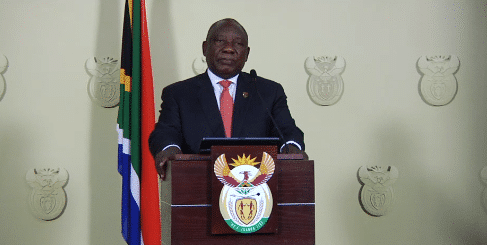While discussing the measures that the government would be taking to combat COVID-19, South Africa’s president Cyril Ramaphosa said in a statement to millions of citizens watching and listening to his speech “The National Coronavirus Command Council has forced a nationwide lockdown for 21 days with effect at midnight on Thursday March 26, 2020”.
Earlier in the day the country’s Health Minister Dr Zweli Mkhize released a statement via his twitter account that the number of confirmed coronavirus cases had risen by 128 to 402. The first case of COVID-19 infection in South Africa was reported on March 5, 2020.
Social media users took to twitter to voice their concerns asking the president to shutdown the country. Shortly afterwards, the hashtags #CyrilRamaphosa #ShutdownSA and #ShutdownSouthAfrica began trending.
Loading...
While addressing the nation Ramaphosa stated that the lockdown is “a decisive measure to save lives of South Africans from infections and save the lives of hundreds of thousands of our people”. The president further stated that while this measure will have a considerable impact on the livelihoods of citizens of the country and the economy, “the human cost of delaying this action would be far far greater”.
What does the lockdown entail?
From midnight the following will happen:
- The lockdown will come to effect on midnight – Thursday, 26th March 2020 until midnight on Thursday April 16, 2020.
- All South Africans will have to stay at home
- The people exempted from the lockdown include health workers in the public and private sectors, emergency personnel, those in security services such as the police, traffic officers, military medical personnel, soldiers, and other persons necessary for the country’s response to the pandemic. This also includes those involved in the production, distribution, and supply of food and basic goods. Essential banking services, the maintenance of power, water and telecommunication services, laboratory services and the provision of medical and hygiene products.
- Individuals won’t be allowed to leave their homes except under strictly controlled circumstances.
- For the homeless, either their existing locations or, where available, alternative temporary accommodation sites, will be used for their 21-day “stay-at-home” period.
- During this period, clinics, pharmacies, food-stores and hospitals will remain open.
- Health care will be provided through triage to obtain “centralised treatment” for severe cases and “decentralised primary care” for mild cases. – A key objective is not to overwhelm hospitals with unnecessary care seekers.
Ramaphosa further stated that the Oppenheimer and Rupert Foundations will provide R1 billion (over $56 million) each to assist small businesses and their employees affected by COVID-19.
Loading...
